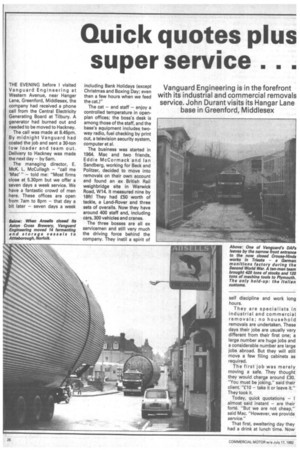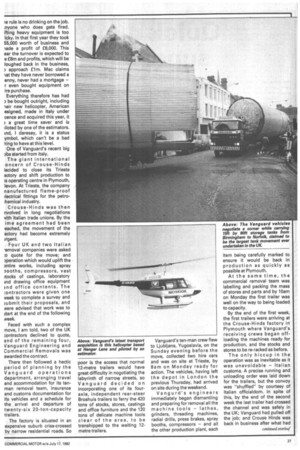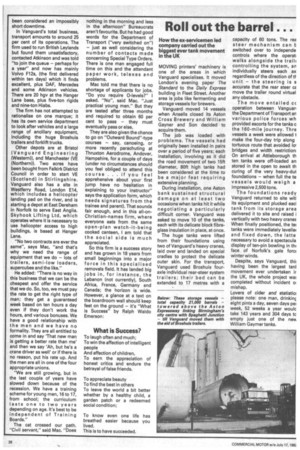Quick quotes plus super service . . .
Page 20

Page 21

Page 22

If you've noticed an error in this article please click here to report it so we can fix it.
Vanguard Engineering is in the forefront with its industrial and commercial removals service. John Durant visits its Hangar Lane base in Greenford, Middlesex
THE EVENING before I visited Vanguard Engineering at Western Avenue, near Hanger Lane, Greenford, Middlesex, the company had received a phone call from the Central Electricity Generating Board at Tilbury. A generator had burned out and needed to be moved to Hackney.
The call was made at 8.45pm. By midnight Vanguard had costed the job and sent a 30-ton low loader and team out. Delivery to Hackney was made the next day — by 5am.
The managing director, E. McK. L. McCullagh — "call me 'Mac'" — told me: "Most firms close at 5.30pm but we offer a seven days a week service. We have a fantastic crowd of men here. These offices are open from 7am to 8pm — that day a bit later — seven days a week including Bank Holidays (except Christmas and Boxing Day; even then a few hours when we feed the cat.)"
The cat — and staff — enjoy a controlled temperature in openplan offices; the boss's desk is among those of the staff, and the base's equipment includes. twoway radio, fuel checking by print out, a television security system, computer et al.
The business was started in 1964. Mac and two friends, Eddie McCormack and Ian Sandberg, working for Beck and Politzer, decided to move into removals on their own account and found an ex British Rail weighbridge site in Warwick Road, W14. It measured nine by 18ft! They had £50 worth of tackle, a Land-Rover and three sets of overalls. Now they have around 400 staff and, including cars, 300 vehicles and cranes.
The three bosses are all ex servicemen and still very much the driving force behind the company. They instil a spirit of self discipline and work long hours.
They are specialists in industrial and commercial removals; no household removals are undertaken. These days their jobs are usually very different from their first one; a large number are huge jobs and a considerable number are large jobs abroad. But they will still move a few filing cabinets as required.
The first job was merely moving a safe. They thought they would charge around £30. "You must be joking," said their client. "f10 — take it or leave it." They took it.
Today, quick quotations — I almost said instant — are their forte. "But we are not cheap," said Mac. "However, we provide service."
That first, sweltering day they had a drink at lunch time. Now le rule is no drinking on the job. .nyone who does gets fired. ifting heavy equipment is too icky. In that first year they took 55,000 worth of business and lade a profit of £8,000. This ear the turnover is expected to e £8m and profits, which will be loughed back in the business,
approach £1m. Mac claims let they have never borrowed a enny, never had a mortgage — r even bought equipment on ire purchase.
Everything therefore has had be bought outright, including -ieir new helicopter, American esigned, made in Italy under cence and acquired this year, it ; a great time saver and is iloted by one of the estimators.
■ nd, I daresay, it is a status ymbol, which can't be a bad ling to have at this level.
One of Vanguard's recent big 3bs started from Italy.
The giant international oncern of Crouse-Hinds lecided to close its Trieste actory and shift production to %operating centre in Plymouth, )evon. At Trieste, the company nanufactu red flame-proof lectrical fittings for the petro,hemical industry.
Crouse-Hinds was then nvolved in long negotiations vith Italian trade unions. By the ime agreement had been eached, the movement of the actory had become extremely agent.
Four UK and two Italian -emoval companies were asked D quote for the move; and 3peration which would uplift the ?Mire works, including spray pooths, compressors, vast ;tocks of castings, laboratory Ind drawing office equipment Ind office contents. The :ontractors were given one rveek to complete a survey and ;ubmit their proposals, and mere advised that work was to ;tart at the end of the following Neek.
Faced with such a complex move, I am told, two of the UK ontractors declined to quote, and of the remaining four, Vanguard Engineering and Commercial Removals was awarded the contract.
There then followed a hectic period of planning by the Vanguard operations department, arranging travel and accommodation for its tenman removal team, insurance and customs documentation for its vehicles and a schedule for the arrival and departure of twenty-six 20-ton-capacity trailers.
The factory is situated in an expensive suburb criss-crossed by narrow residential roads. So poor is the access that normal 12-metre trailers would have great difficulty in negotiating the labyrinth of narrow streets, so Vanguard decided on incorporating one of its fouraxle, independent rear-steer Broshuis trailers to ferry the 420 tons of stocks, stores, castings and office furniture and the 120 tons of delicate machine tools clear of the area, to be transhipped to the waiting 12metre trailers. Vanguard's ten-man crew flew to Ljubljana, Yugoslavia, on the Sunday evening before the move, collected two hire cars and was on site at Trieste, by 8am on Monday ready for action. The vehicles, having left the depot in London the previous Thursday, had arrived on site during the weekend.
Vangurd's engineers immediately began dismantling and preparing for removal all the machine tools — lathes, grinders, threading machines, radial drills, press brakes, spray booths, compressors — and all the other production plant, each item being carefully marked to ensure it would be back in production as quickly as possible at Plymouth.
At the same time, the commercial removal team was labelling and packing the mass of stores and parts and by 10am on Monday the first trailer was well on the way to being loaded to capacity.
By the end of the first week, the first trailers were arriving at the Crouse-Hinds factory in Plymouth where Vanguard's receiving crews began offloading the machines ready for production, and the stocks and stores to be re-racked as before.
The only hiccup in the operation was as inevitable as it was unavoidable — Italian customs. A precise running and unloading order was laid down for the trailers, but the convoy was "shuffled" by courtesy of Italian officialdom. In spite of this, by the end of the second week the last trailer had crossed the channel and was safely in the UK; Vanguard had pulled off the job; and Crouse Hinds was back in business after what had been considered an impossibly short downtime.
In Vanguard's total business, transport amounts to around 25 per cent of its operations. The firm used to run British Leylands but found them unsatisfactory, contacted Atkinson and was told "to join the queue perhaps for a year" and now has mainly Volvo F12s, (the first delivered within ten days) which it finds excellent, plus DAF, Mercedes and some Atkinson vehicles. There are 20 hgv at the Hanger Lane base, plus five-ton rigids and nine-ton Hiabs.
The firm has not attempted to rationalise on one marque; it has its own service department to look after vehicles and a large range of ancillary equipment, including the huge Broshuis trailers and forklift trucks.
Other depots are at Bristol (Vanguard Engineering (Western)), and Manchester (VE (Northern)). Two acres have been bought from Falkirk District Council in order to start VE (Scotland) in Stirlingshire. Vanguard also has a site in Westferry Road, London E14, which includes a helicopter landing pad on the river, and is starting a depot at East Dereham in Norfolk to serve East Anglia. Skyhook Lifting Ltd, which operates where it is necessary to use helicopter access to high buildings, is based at Hanger Lane.
"No two contracts are ever the same", says Mac, "and that's why we need the range of equipment that we do lots of trailers, semi-low loaders, supercubes and the like."
He added: "There is no way in this business that we can be the cheapest and offer the service that we do. So, too, we must pay the rate to get the right type of man; they get a guaranteed week based on ten hours a day even if they don't work the hours, and various bonuses. We have a good relationship with the men and we have no formality. They are all entitled to come in and say 'That new man is getting a better rate than me' and then we say 'Ah, but he's a crane driver as well' or if there is no reason, put his rate up. And the men are all in one of the four appropriate unions.
"We are still growing, but in the last couple of years have slowed down because of the recession. We have a training scheme for young men, 16 to 17, from school; the curriculum lasts one to two years depending on age. It's best to be independent of Training Boards."
The cat crossed our path. "Civil servant," said Mac. "Does nothing in the morning and less in the afternoon" Bureaucrats aren't favourite. But he had good words for the Department of Transport ("very switched on") just as well considering the number of contacts made concerning Special Type Orders. There is one man engaged full time on this and the attendant paper work, telexes and problems.
Mac told me that there is no shortage of applicants for jobs. "Do you require 0-levels?" I asked. "No", said Mac. "Just practical young men." But they are tested after three months and required to obtain 60 per cent to pass they must eventually pass or else.
They are also given the chance to go on "Outward Bound"-type courses say, canoeing, or more recently parachuting at Thruxton Aerodrome, Andover, Hampshire, for a couple of days (under no circumstances should you feel obliged to attend this course . . . if you feel apprehensive about your first jump have no hesitation in explaining to your instructor" says the application form, which needs signatures from the trainee and parent). That sounds fair enough, and in this all-onChristian-names firm, where everyone eats from the same open-plan watch-it-being cooked canteen, I am told that the social side is much appreciated.
So this firm is a success story and has grown in 18 years from small beginnings into a major force in this specialised removals field. It has landed big jobs in, for instance, the Lebanon (not currently), South Africa, France, Germany and Canada; the horizon is wide. However, a glance at a text on the boardroom wall should keep feet on the ground it's "What is Success" by Ralph Waldo Emerson:
What is Success?
To laugh often and much; To win the affection of intelligent people And affection of children, To earn the appreciation of honest critics and endure the betrayal of false friends.
To appreciate beauty To find the best in others To leave the world a bit better whether by a healthy child, a garden patch or a redeemed social condition; To know even one life has breathed easier because you lived.
This is to have succeeded.
















































